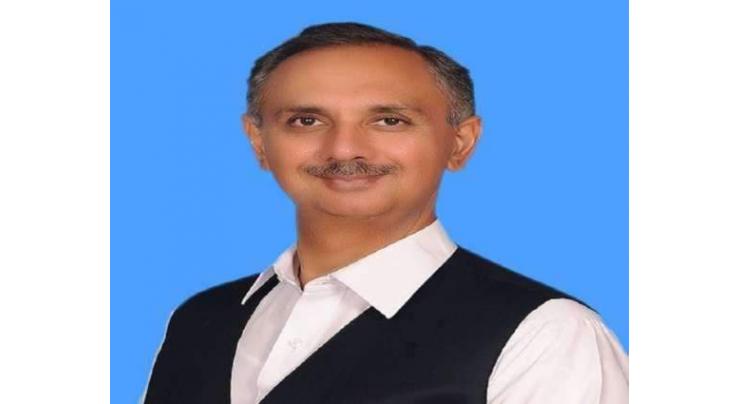
- Home
- Pakistan
- News
- Govt focusing on establishing small energy units to mitigate energy demand supply gap: Omar Ayub Kha ..
Govt Focusing On Establishing Small Energy Units To Mitigate Energy Demand Supply Gap: Omar Ayub Khan
Rukhshan Mir (@rukhshanmir) Published November 20, 2018 | 07:04 PM

Minister for Power Division Omar Ayub Khan Tuesday said the government was focusing on power generation, transmission and establishment of small energy set ups which would help to cope with the energy shortage in the country.
Addressing the Consultative Workshop on Renewable Energy Policy, he denounced the fact that there was no proper demand analysis carried out so far and said the demand was estimated through the economic development ratio of the country.
The event was organized by Alternative Energy Development board aiming to highlight the importance of the renewable energy in the changing dynamics and its role in economic development and social prosperity of the country.
Omer Ayub said outcomes of the workshop and opinions of the energy experts would be duly incorporated in policy making to exploit the existing potential of the renewable energy to produce affordable energy mix in the country.
"There was a paradigm shift across the globe in renewable and alternate energy as a spike decline has been observed in the cost of renewable energy," he observed .
The minister further said in future renewable energy cost would go below 2 cents at the optimum level of production, adding that it was vital to provide cost effective and sustainable energy supply to industrial as well as domestic sectors.
In order to make ours produces competitive in international markets, there was a dire need to introduce cheap energy mix for the local industrial sector to reduce the cost of production to accelerate the exports and reduce the imports.
He said about 85 percent Chinese exports proceedings come from its 2 to 3 per cent land mass in the coastal region which that had reduced the cost of transportation and make them competitive in the international market.
The competency and efficiency had jacked up the Chines exports to manifold and helped it to become the industrial giant of the world , he remarked.
The minister stressed the need for exploring the untapped potential of renewable energy for rapid economic development and bridging the gap of twin deficits including current account deficit and fiscal deficit.
He also called for working on modern lines and proper planning in a rational and scientific way for introducing sustainable and long term energy solutions.
He said Pakistan's per capita consumption was 400 kilowatts (KW) while in the neighbouring countries China and India its was 4000 KW and 950 KW respectively, adding that the local population was comprising on 20 million people and out of the total population 27 percent does not have the access to the electricity, particularly in the rural areas of the country.
He said the size of parallel economies in the developed countries like USA and European Union was 12 per cent of their GDP whereas in developing countries like Pakistan it was necessary to count those like taxi drivers, shopkeepers and other small businesses in our economy.
He said the incumbent government was also converting around 27,000 tubewells in Balochistan over Solar energy to assist energy stressed agriculture sector particularly farmers of the province.
AEDB chief executive officer Amjad Ali Awan said the consultative workshop had been organized to get valuable ideas of expert masses on renewable energy policy and initiatives.
"We are in a crucial time where abrupt changes in the energy sector are taking place amid severe power crisis in the country." He said it was only observed to be merely 4000 megawatts (MW) shortfall in the country's energy cohort while after deep analysis the situation has appeared to be more complex and challenging.
Awan said it was time to take robust initiatives to indigenous renewable energy projects in the country as there were not depleting and untapped renewable power resources.
He said the policy framework time line had ended in March 2018 which was also the agenda of today's workshop either it should be extended or not.
Related Topics
Recent Stories

Punjab CM inaugurates Pakistan’s first Virtual Women Police Station

Dutch model Donny Roelvink embraces Islam

Experts raise concerns over introduction of 10-stick packs

Iranian president arrives in Karachi

Law Minister expresses Govt's resolve to address issue of missing persons

Rizwan’s batting order may be changed: Sources

Nawaz Sharif to visit Guangzhou exhibition in China

FM Dar not traveling to China: Foreign Office

PM takes notice of deliberate delay in tax cases

Iranian President visits Allama Iqbal’s mausoleum

Iranian President arrives in Lahore today

Currency Rate In Pakistan - Dollar, Euro, Pound, Riyal Rates On 23 April 2024
More Stories From Pakistan
-
Iranian President reiterates commitment to promote bilateral relation with Pakistan
7 hours ago -
KP CM chairs meeting of Integrated Security Architecture’s apex committee
8 hours ago -
President Raisi accorded warm welcome on arrival in Karachi
8 hours ago -
Spending quality time in nature may lower heart disease, diabetes risk: Study
8 hours ago -
President Raisi pays respects at Quaid's mausoleum
8 hours ago -
FM Dar speaks to overseas Pakistanis via Zoom
8 hours ago
-
Govt to form parliamentary committee to end violence in Balochistan: CM Bugti
8 hours ago -
LESCO collects over Rs 4.48m from 104 defaulters in 24 hours
8 hours ago -
Dr. Jamileh calls for role of Muslim women for promotion of Islamic culture
8 hours ago -
LESCO detects 73,722 power pilferers in 217 days
9 hours ago -
Farmers express concerns on low wheat price in market
9 hours ago -
CEO SEPCO for taking action against those involve in over billing & power theft
9 hours ago